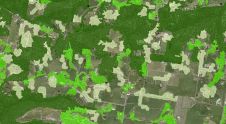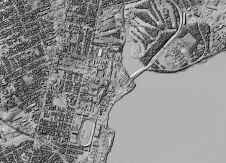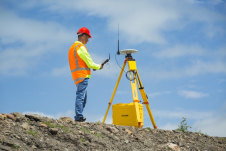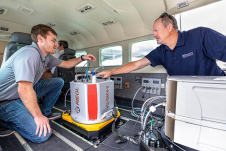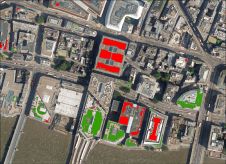Delair Chooses Septentrio AsteRx-m2 for New Large-area Mapping UAV
GNSS receiver manufacturer Septentrio has been selected to supply its high-precision AsteRx-m2 GNSS OEM receiver module and PPK library for use with Delair’s UX11 – a lightweight, BVLOS-ready fixed-wing mapping UAV. The combination of on-board processing capabilities, real-time control and centimetre-level precision makes it a cost-effective solution for large-area surveying and mapping.
By employing the latest high-spec photographic, sensor and communications elements, Delair has kept the weight of the UX11 including payload down to an impressive 1.4 kg (3.1 ). Among other design innovations, this allows the UX11 to cover 200 ha (500 acres) in a single one-hour flight, delivering mapping with GSDs below 1 cm/px (0.4 in/px) with accuracy down to 1.27 cm). A 3G/4G network link to the UX11 allows the operator to assess in real-time, the quality and overlap of images during flight and make any necessary adjustments to the settings of the integrated camera meaning collecting as many aerial intelligence as possible, in a minimum number of flights. The UAV also features BTOL (bird-like take-off and landing) for steep-climb take offs and descents in confined areas.
The AsteRx-m2 is the best fit for the UX11. It delivers high-precision multi-frequency quad-constellation GNSS measurements for PPK (Post-Processed-Kinematic) for only 28g and the lowest power consumption of any comparable device on the market.
Long-range UAV platform
The combination of high-quality camera images and GNSS measurements from the AsteRx-m2 allows Delair to offer its users PPK survey-grade ground precision down to 1 cm. With Delair’s PPK software, powered by Septentrio’s GeoTagZ PPK library, users only pay for the precision they need and on a flexible pay-as-you-go basis.
With the AsteRx-m2, we can offer wide-area coverage at ultra-high precision, explainsChase Fly, geospatial product manager at Delair. According to Fly, theDelair UX11sets a new standard of efficiency, cost and quality in a long-range UAV platform. The drone itself is state-of-the-art in its design and construction, and it enables industry-leading performance and flight range, as well as streamlined maintenance, advantages that all reduce costs. The integrated processing capabilities are able to ensure image quality in real time and provide users with accurate results that shape critical operational decisions and strategies. And it’s designed for flexible use in a variety of conditions and use models, further lowering TCO.
Positioning algorithms
The AsteRx-m2 features Septentrio’s proprietary GNSS+ suite of positioning algorithms to convert difficult environments into good positioning. LOCK+ technology to maintain tracking during the heavy dynamic vibration typical of UAV flights, APME+ to combat multipath and IONO+ technology to ensure position accuracy during periods of elevated ionospheric activity. The AsteRx-m2 also features AIM+ interference mitigation and monitoring system which can suppress the widest variety of interferers, from simple continuous narrowband signals to the most complex wideband and pulsed jammers. AIM+ can diagnose self-interference from other electrical or electronic devices onboard the UAV as well as mitigating external interference during operational flights.
Driven by the explosion in the number and variety of drone applications, drone technology has advanced leaps and bounds in recent years and Delair have been right at the heart of the action. With their focus on innovation and a commitment to providing the very highest quality products, Delair and Septentrio are true kindred spirits and we’re proud to be part of the UX11 project, said Gustavo Lopez, product manager at Septentrio.
Make your inbox more interesting.Add some geo.
Keep abreast of news, developments and technological advancement in the geomatics industry.
Sign up for free

